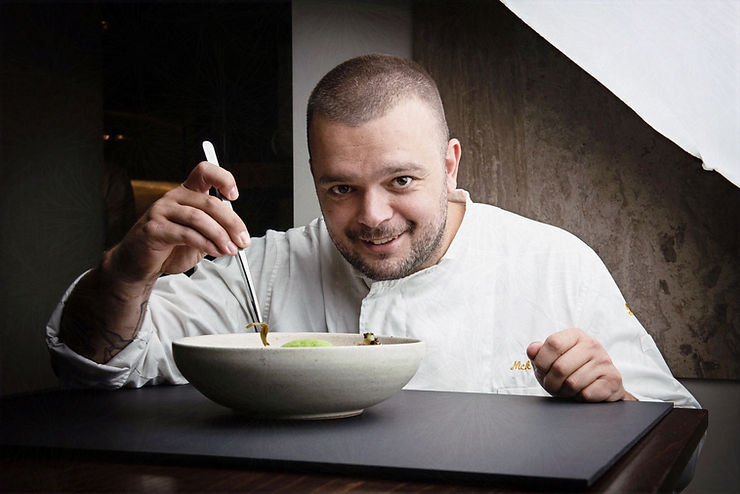
Nikos Thomas is one of the most talented, stable and effective chefs of the new generation, who have systematically and with vision invested in the upgrading of Greek cuisine. He recently won the television cameras through his presence in Master Chef, but the devotees of good food had already distinguished him, four years ago, since the moment he began to unfold his talent, at Simul, his own restaurant, located in a magnificent neoclassical building on the outskirts of Kolonaki.
He manages to balance the business with the creative part, having a global perception of catering, which not only does not limit him, but gives him the flexibility to experiment and incorporate Greek gastronomic tradition and modern flavors into his dishes.
“I wasn’t born a cook, it just happened along the way, I liked it and I chose it,” he says, clarifying that he is not one of those chefs who, as a child, used to hang around his mother’s kitchen.
His previous work includes stints at well-known Athenian restaurants, such as Mani Mani and Cookoovaya, while he is the most beloved figure behind the scenes of the successful cooking reality show Master Chef.
Is it easy to combine the dual identities of chef and owner?
I have found my peace, however, the business side can limit you, but I try to balance it. I thought it would be easier, but it is very difficult to have to think outside the kitchen box, to have a more holistic perception of catering. However, I am lucky because I have the absolute freedom to try whatever I want.
Does it require a lot of experimentation before you put it on the plate?
Yes, and reading and research, although I think that the biggest investment a chef can make is traveling. They are even better than seminars.
Ultimately, what plays a role in success? Education, skill or imagination?
It is a combination of all. If you do not have technical training, no matter how much inspiration you have, your dish will not turn out. If you have technical training and no inspiration at all, you will still not come up with anything special. However, luck and timing play a role, in which kitchens you will find yourself, by whom you will be influenced, before you find yourself in a position to put yourself out there.
How would you characterize Simul’s style?
Now, we are more consciously following the new trend called technical bistrot, which has come to “click” with what we were doing. Abroad, many chefs are leaving big restaurants and opening bistros where, without having to spend a fortune, you can enjoy food that is nothing compared to fine dining restaurants.
You are one of those chefs who loves to cook. In your menus, you “play” a lot with combinations and unusual ingredients.
I have a lot of things in mind, recipes, menus. I like misunderstood ingredients and by-products, but you have to introduce them to customers little by little. I was excited when I tried the skate cheeks. I love the marrow. I think it can stick to anything that lacks intensity and take it off – and these are ingredients that will soon be on our minds.
Have you been excited about any trend lately?
I follow trends, filter them, and if they fit my cooking, I might adopt them. If not, I won’t. For example, I prefer to eat bao ban at Venieris rather than cook it in my own kitchen. What I generally see is that bistronomy is flourishing, which we continue to serve consistently at “Simul”.
Who has influenced you in your career?
Dimitris Skarmoutsos. Although we have never met in a kitchen, we have spent many hours talking and without ever talking about dishes or recipes, it has always been very essential for my work. As has Vangelis Liakos. I seek conversations with people in the kitchen who have more experience than me, I enjoy it.
SIMUL gastronomic situ (Ypsilantou 63, Kolonaki, tel. 210 7224737, info@simul.gr)

